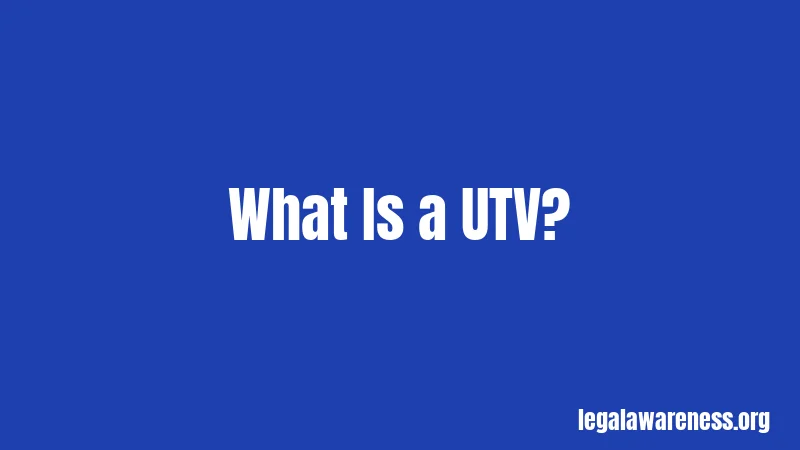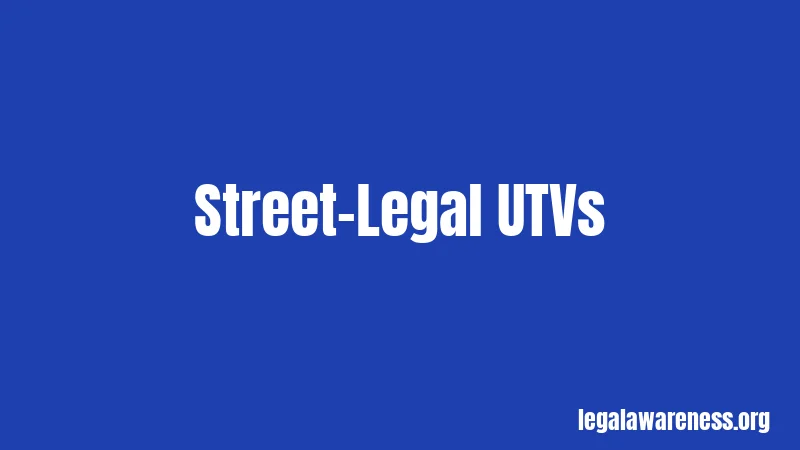UTV Laws in Florida (2026): Your Complete Riding Guide
Most people don’t realize how strict Florida’s UTV rules actually are. Seriously. You could be breaking the law without even knowing it. Let’s break down everything you need to know about riding UTVs in the Sunshine State.
If you own a UTV or you’re thinking about getting one, this matters. Florida has specific rules about where you can ride, what safety gear you need, and how old you have to be. The penalties for breaking these laws can surprise you.
What Is a UTV?

UTV stands for Utility Task Vehicle. Basically, it’s a small motorized vehicle designed for off-road use. Think of it as a four-wheeler or side-by-side that you can take on trails and rough terrain.
UTVs come in different sizes and types. Some have two seats. Others seat more. But Florida treats them all the same way under the law. And yeah, that’s pretty straightforward.
Where You Can and Cannot Ride
Here’s where things get important. You can’t just ride your UTV anywhere you want in Florida.
Public Land Rules
You can ride on designated trails in state forests and off-road parks. But here’s the key: the area has to be specifically marked for UTV use. If there’s no sign saying UTVs are allowed, don’t assume you can ride there. Wondering if your favorite spot is legal? Check with the Florida Forest Service or the local park office first.
Private Property
You can ride on your own property without a problem. But here’s the catch. If the property isn’t yours, you need written permission from the owner. No exceptions. If you ride on someone else’s land without permission, you’re trespassing. That can lead to serious consequences.
Prohibited Areas
You absolutely cannot ride on public roads unless your UTV is street-legal (more on that in a moment). Most UTVs aren’t street-legal. That means they can’t be operated on sidewalks, bike paths, highways, or any public road. Not even for a quick trip to the store down the street.
Florida state parks also prohibit UTVs in most areas unless there’s a specific off-road trail marked for them. National forests have their own rules too. Wait, it gets more complicated. Different forests have different regulations. Some allow UTVs. Others don’t. Check ahead.
Age Requirements

You need to be old enough to operate a UTV legally in Florida. Here’s what the law says.
If you’re under 16 years old, you cannot operate a UTV on any public land. Period. This includes state forests and off-road parks. You’re not allowed to ride alone, and you’re not allowed to ride with adult supervision. The age rule is firm.
Riders aged 16 and older can operate UTVs on designated public trails. But here’s something important. If you’re between 16 and 18, you still need parental permission. Some areas also require you to complete a safety course. Honestly, taking that course is a good idea anyway.
Safety Requirements
Florida takes UTV safety seriously. You need to wear the right gear every single time you ride.
Helmets
You must wear a helmet that meets Department of Transportation standards. Not just any helmet. It has to be a DOT-approved helmet. This applies to everyone, regardless of age. No exceptions.
Actually, this is the part most people get right. A good helmet can literally save your life. Wear it every time.
Protective Gear
Beyond helmets, you need eye protection. That means goggles or a face shield. Riding without them is illegal if you’re on public land.
Wear long sleeves and long pants too. These aren’t just suggestions. On public trails, protective clothing is required. Think of it like a seatbelt in a car. It’s there because crashes happen.
Vehicle Requirements
Your UTV needs to be in good working condition. The brakes have to work properly. The steering has to function. Lights and reflectors need to be in place if you’re riding at dawn, dusk, or night.
Not sure if your UTV meets the requirements? It probably does if it’s a newer model. Older or modified UTVs might have issues. Getting it inspected before you ride is smart.
Street-Legal UTVs

Okay, here’s where it gets interesting. Some UTVs can be street-legal in Florida. But it’s not automatic.
Your UTV needs to meet specific requirements to drive on public roads. It needs working headlights, taillights, turn signals, mirrors, and windshield wipers. The engine can’t be too loud. It needs seat belts and a proper steering wheel.
Sound like a lot? That’s because it basically turns your UTV into something that looks like a golf cart or small car. Most people’s UTVs aren’t set up this way. So most people can’t drive theirs on public streets.
To register a street-legal UTV, you’ll need to go through the Florida Department of Motor Vehicles. You’ll pay registration fees. Your insurance costs will go up. It’s doable, but it’s not simple.
Noise Laws
Florida has strict rules about how loud your UTV can be. This one surprises a lot of people.
Your UTV cannot exceed 86 decibels at 50 feet away. That’s pretty quiet for an engine. Most stock UTVs meet this requirement. But modified UTVs with aftermarket exhaust systems often don’t.
If you’ve added custom pipes or removed the muffler, your UTV is probably too loud. Like, definitely too loud. You could get a fine.
Helmet Safety Course
Taking a safety course is really encouraged. Some areas require it. Most don’t, but honestly, you should do it anyway.
Florida offers UTV safety courses through the state. These courses teach proper riding technique, safety, and trail etiquette. They take a few hours. After you complete one, you might qualify for insurance discounts. Many insurance companies reward safe riders.
Want to find a course near you? The Florida Fish and Wildlife Conservation Commission can point you in the right direction.
Penalties and Consequences
So what happens if you break the rules? The consequences can be serious.
Fines
Riding without a helmet can cost you $30 to $500 depending on the violation. Riding on a public road with a non-street-legal UTV can result in a fine up to $500. Trespassing on private property with your UTV can mean even more.
Multiple violations add up fast. One mistake might be a small fine. But if you keep breaking the rules, costs climb.
Criminal Charges
Repeat offenders can face criminal charges. Trespassing on private land repeatedly could result in misdemeanor charges. That means potential jail time, not just fines.
If you cause damage to property while trespassing, you could be liable for that damage too. You’d have to pay for repairs.
License Suspension
In serious cases, your driver’s license can be suspended. This is rare, but it happens. If you cause an accident while riding illegally, and someone gets hurt, you could lose your driving privileges.
Vehicle Seizure
Law enforcement can seize your UTV if you’re caught using it illegally. You’d have to go through a legal process to get it back. And honestly, that’s a hassle nobody wants.
Riding at Night
You’re wondering if you can ride after dark, right? Technically, yes. But there are rules.
Your UTV must have working headlights and taillights. You need those lights on. Reflectors need to be visible. And honestly, riding at night is riskier anyway. You can’t see obstacles as well. Wildlife is more active at night in Florida.
Most designated trails close at sunset. Check local regulations before you plan a night ride.
Young Riders and Parental Responsibility
If your kid wants to ride a UTV, pay attention to this part. Parents are responsible for their children’s safety and legal compliance.
Your child must wear proper protective gear every time. No exceptions. Provide a helmet, goggles, and protective clothing. Make sure they understand the rules before they ride.
If they’re under 16, they cannot ride on public land. If they’re 16 to 18, they need your permission and supervision. Not every adult can teach proper technique. Consider hiring a professional instructor instead.
By the way, if your child violates UTV laws while riding, you could potentially face liability. Stay involved.
Insurance and Registration
Most UTV owners think about insurance after they get stopped. Don’t be that person. Get insurance first.
Standard auto insurance typically doesn’t cover UTVs. You need specific UTV or powersports insurance. This covers theft, damage, and liability if you hurt someone while riding.
Registration isn’t required for UTVs used only on private property. But if you take your UTV on any public land, even a designated trail, registration is smart. It proves you own the vehicle and have the right to operate it.
Some counties require UTV registration. Check with your local Department of Motor Vehicles. Registrations typically cost between $30 and $75 annually.
Right of Way on Trails
When you’re on a shared trail, you need to know trail etiquette. This isn’t just polite. It’s sometimes required by law.
Hikers and horseback riders have the right of way over UTVs. If you see someone on foot or on a horse, move to the side and let them pass. This protects them and prevents conflicts.
Smaller vehicles give way to larger ones. If you encounter a full-size truck on a trail, they have the right of way.
Stay on marked trails. Don’t create new paths. Stay to the right side of the trail unless you’re passing. Slow down near other users.
Modifications and Aftermarket Parts
You want to customize your UTV? Hold on, this part is important.
Modifications like lift kits, bigger tires, and custom seats are usually fine. But anything that changes the noise level or emissions can be illegal. That custom exhaust system? Probably violates Florida law.
Engine modifications that increase noise above 86 decibels are against the law. Removing or modifying the muffler is a no-go. Your UTV doesn’t need to sound like a racecar.
If you’re not sure whether a modification is legal, ask a dealer or contact local law enforcement before you install it.
Environmental Protection
Florida cares about protecting natural areas. You should too.
Stay on marked trails. Riding off-trail damages vegetation and erodes soil. It disrupts wildlife habitats. The fines for environmental damage can be significant.
Don’t dump fuel, oil, or trash on trails. Pack out everything you pack in. Many trails are in sensitive ecosystems. Lake regions, wetlands, and protected forests need special care.
Violating environmental protection laws can result in fines up to $500 or more.
Recent Changes and Updates
Florida’s UTV laws haven’t changed dramatically in recent years, but enforcement has gotten stricter. Parks are cracking down on unauthorized riders. Trespassing penalties have become more serious.
In 2024 and 2025, several counties increased their enforcement efforts. More patrols on popular trails. Stricter penalties for violations. If you haven’t checked the rules lately, now’s the time.
The noise limit of 86 decibels has been enforced more consistently too. So if your UTV is on the borderline, it might be a problem.
How to Ride Legally
Okay, so you want to do this the right way. Here’s exactly what you need to do.
First, get proper gear. Invest in a DOT helmet, goggles, and protective clothing. Don’t cheap out here. Good gear lasts years.
Second, check if your riding area requires registration or permits. Contact the Florida Forest Service or local park office. Ask what documents you need.
Third, get insurance. A powersports insurance policy protects you if something goes wrong. It’s not expensive, and it’s worth it.
Fourth, know the rules before you ride. Read trail guides. Understand age requirements. Learn the noise regulations for your area.
Finally, ride responsibly. Stay on trails. Respect other users. Follow all posted signs. Honestly, this keeps everyone safe.
Where to Find More Information
The Florida Fish and Wildlife Conservation Commission is your best resource. They manage public lands and regulate UTV use. Their website has trail maps, regulations, and safety information.
Your county’s Parks and Recreation Department can tell you about local trails and rules. The Florida Department of Motor Vehicles handles registration questions.
Before you ride anywhere new, call ahead and ask. A five-minute conversation can prevent a fine or worse.
Frequently Asked Questions
Can I ride my UTV on the beach in Florida?
Beach riding is restricted in most areas. Some designated beaches allow it during certain seasons, but most don’t. Always check with the local park office first.
What if I get caught riding without a helmet?
You’ll face a fine up to $500, depending on the circumstances. If you have previous violations, the penalties are worse.
Do I need insurance for a UTV used only on private property?
It’s not required by law, but it’s highly recommended. Insurance protects you if someone gets hurt on your property.
Can my 14-year-old ride a UTV on our private land?
Yes, on your private property. But they cannot ride on any public trails or designated riding areas until they’re 16.
How do I know if my UTV is street-legal?
Check if it has headlights, taillights, turn signals, mirrors, and seat belts. Most stock UTVs don’t meet these requirements. If you’re unsure, visit your local DMV.
What’s the loudest my UTV can be?
86 decibels at 50 feet away. Most stock UTVs meet this. Aftermarket exhausts usually don’t.
Can I ride on trails after sunset?
Only with proper lighting. Your UTV needs working headlights and taillights. Many trails close at sunset anyway.
What happens if I trespass on private property with my UTV?
You could face trespassing charges, fines up to $500, and potential liability for any damage. Don’t do it.
Do I need a special license to operate a UTV?
No special license is required for riding off-road. But a safety course is encouraged.
Where can I find legal trails near me?
Contact the Florida Fish and Wildlife Conservation Commission or your county Parks and Recreation Department.
Final Thoughts
Now you know the basics of UTV laws in Florida. The rules exist to keep you safe and protect the environment. Follow them, and you can enjoy years of riding without problems.
The biggest takeaway? Don’t assume anything is legal. Check before you ride. Call ahead. Wear your gear. Respect private property and natural areas. It’s really that simple.
Stay informed, stay safe, and have fun out there. Your UTV adventures await, just do it the right way.
References
Florida Statutes Chapter 790 – Weapons and Firearms
Florida Fish and Wildlife Conservation Commission – Off-Road Vehicle Rules
Florida Department of Motor Vehicles – Vehicle Registration
Florida Parks and Recreation – Trail Guidelines
Florida Administrative Code 62-330 – Environmental Protection Standards
